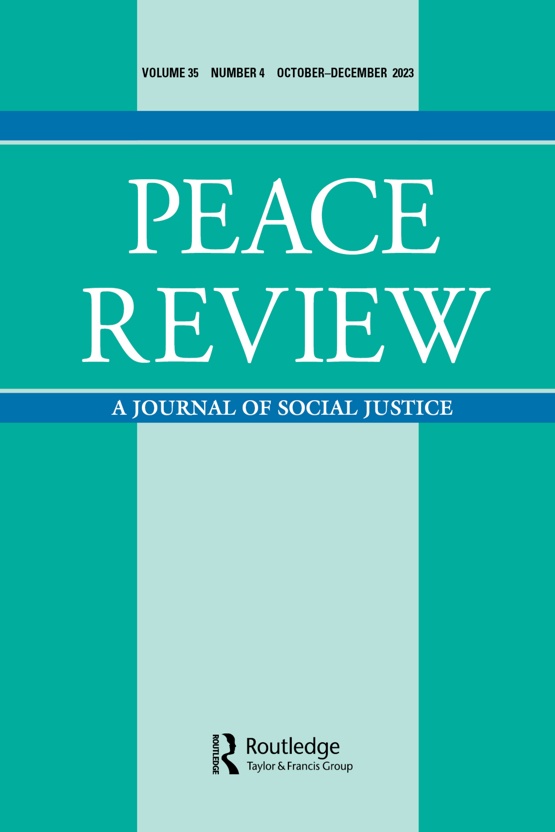Submit a Manuscript to the Journal
Peace Review
For a Special Issue on
Children & the Future
Abstract deadline
12 October 2023
Manuscript deadline
15 January 2025

Special Issue Editor(s)
Madelaine Hron,
Wilfrid Laurier University
[email protected]
Sarah Currie,
University of Waterloo
[email protected]
Children & the Future
Under the guest editorship of Madelaine Hron, Associate Professor in the English and Film Studies Department at Wilfrid Laurier University, and Sarah Currie, Lecturer in the English Language and Literature Department at the University of Waterloo, Peace Review: A Journal of Social Justice 37(2) invites essays for a special issue on Children and the Future.
We welcome submissions for a special issue that explores the concept of “children as the future” in all possible terms: in relation to peace, justice, post-conflict, development, humanitarianism, education, environmentalism, resistance, activism, and in particular, in terms of rights issues, both current and emergent rights. While we expect most submissions to come from academics in the social sciences and humanities, we also invite submissions from writers, artists, community groups and youth activists.
Children have long been associated with futurity, either as a promise or as a warning for the future. As Lee Edelman points out in No Future, current politics and ideologies regularly legitimate their actions in the name of children: “the Child has come to embody for us the telos of the social order and come to be seen as the one for whom that order is held in perpetual trust” (2004, 11). He further argues that an idealized, aspirational vision of the future is inextricably linked with children: “we are no more able to conceive of a politics without a fantasy of the future than we are able to conceive of a future without the figure of the Child.” (2004, 11) Canadian Indigenous communities have long upheld the Seven Generation Principle, which maintains that the decisions we make today should result in a sustainable world seven generations into the future– certainly an aspirational model in our current climate crisis and post-pandemic world. Although children account for 25% of the world’s population, and in some African countries are more than 40% of the population, children have rarely been granted equal rights with adults. Rather, they are considered a vulnerable sector in need of adult protection, guidance and care. However, many children today are resisting this humanitarian model, based on adult-centrism and lack of agency; on the contrary, increasingly, youth activists are rising up to demand a viable future for themselves and other children (eg. Greta Thurberg, Haaziq Kazi, Xiuhtezcatl Martinez etc).
General themes that contributors can address in their essays include, but are not limited to, the following:
- Theorizations of the “children as the future,” conceptualizations of “futurity” and/or frameworks such as “juvenile resistance,” “anticolonial futures,” etc.
- Children and gender-based rights
- Rights models which consider children and the future, (e.g, UN Convention of the Rights of the Child, Seven Generation Principle, religious or spiritual models)
- The future of current rights issues affecting children (e.g., gender rights and children, child soldiers, child refugees, child labour, child slaves, etc.)
- Children and possible futures in conflict or post-conflict areas (e.g., Rwanda, Kosovo, Syria, Ukraine etc.)
- Pedagogies and/or education for the future
- Children engaging in future-centric modes of resistance
- Children and environmental activism
- Children and indigenous, queer, eco-critical and/or posthumanist modes of resistance
- Inclusivity, neurodivergency, ableism classism or discrimination for children of the future
- Children, emerging rights and/or rights of the future (e.g., cloning, robots, reproductive rights, environmental refugeedom etc.)
- Children and rights in sci-fi, fantasy or post-apocalyptic representations
Looking to Publish your Research?
Find out how to publish your research open access with Taylor & Francis Group.
Choose open accessSubmission Instructions
Essays keen to be considered for inclusion in this special edition should be uploaded to the Peace Review Journal website no later than January 15, 2025.
Peace Review accepts the following types of articles: Essay, Review, Interview, Collection, Oration
Articles should be submitted via the journal online portal and utilize the Taylor & Francis Citation style and Journal WORD Template.
- Essays: 2500–3500 words, excluding references.
- Reviews: 3000-3500 words, excluding references.
- Interviews: 1200-1500 words, including context
- Collections: 1800-2000 words + 3-5 photos or images, excluding references
- Oration: 3–5-minute audio file + transcription, accompanied by a written introduction/analysis of 800-1000 words
Content Questions
Expression of Interest and questions to the guest editors are welcome, and may increase the chance of publication. Please direct content-based questions or concerns to both guest editors: Madelaine Hron: [email protected] and Sarah Currie [email protected]